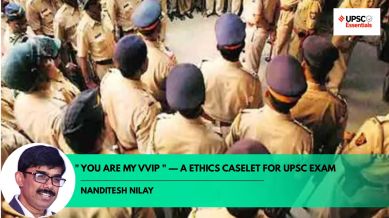UPSC Ethics Simplified | How must a police officer choose between a VVIP and a common man at ‘Ram Lalla’ Darshan? Here’s a caselet
UPSC Ethics Case Study : When duty meets compassion, a police officer faces a quiet ethical test during a high-pressure situation. This caselet challenges our ideas of responsibility, fulfillment, and what it truly means to serve.

“One who is devoted to one’s duty attains the highest perfection in life.” It sounds like a simple quote, doesn’t it? But what if you have to analyze this statement in the context of a civil servant’s sense of responsibility and personal fulfillment? There are times when, even if a civil servant is ethical at heart, the demands of duty can create a dilemma. But then, isn’t it important to ask what ‘duty’ truly means to an officer? UPSC has often framed questions and case studies, directly or indirectly, around this issue. Nanditesh Nilay, our ethicist, helps explore this question through a caselet.
“You are my VVIP” : A caselet of duty, compassion, and ethics in action
He was the SSP (Senior Superintendent of Police) of the district, and that day, owing to a high-profile VVIP visit, he was on duty at one of the most significant religious sites. The atmosphere was tense. Any moment now, a dignitary was expected to arrive with their family. Meanwhile, crowds of devotees had gathered in large numbers, waiting for a glimpse (Darshan) of the deity.
In the middle of this high-security chaos, someone gently tapped the SSP from behind. It was an elderly woman, accompanied by her daughter and son-in-law, both senior citizens. She pleaded with folded hands for a chance to have Darshan. The SSP listened patiently and asked her to wait, explaining that the area was under strict control due to the imminent VVIP movement.
But the old woman’s desperation was palpable. She was gasping for breath, sweating heavily, and clearly unwell. She revealed she had been fasting all day, holding onto a single desire: to see Ram Lalla, the child form of Lord Rama, just once.
Sensing her urgency, and after learning the VVIP would be at least 15 minutes late, the SSP made a decision. He personally escorted the elderly trio inside.
Within a minute, the woman stood before the idol. The SSP expected her to be overwhelmed with joy but something was wrong. She couldn’t see clearly. She had forgotten her glasses.
Time was ticking. The dignitary could arrive at any moment. The SSP hesitated for a second, then swiftly removed his own glasses and gently placed them on the woman’s eyes. Her face lit up instantly. She smiled like a child, overcome with joy. Tears flowed freely as she finally saw her beloved deity, though not perfectly, but still better than before.
The moment was sacred. She clutched the glasses for a moment longer, then wiped them and handed them back.
While leaving, she turned to the officer and asked, “Where is your VVIP, son?”
He smiled and replied, “You are my VVIP.”
More than a protocol, ethics behind a police officer’s decision
When we consider the above case, both deontological and teleological theories of ethics draw our attention. Deontological ethics are ethics of duty, while teleological ethics focus on results or consequences.
In this situation, the elderly lady was able to see the idol, and thus the telos—meaning completion or finality—defined the act. Therefore, the knowledge (logos) of the telos becomes the utility of that act. In this way, the principle of utilitarianism was evident, and happiness was experienced by the old lady, her family, and the SSP.
On the other hand, deontological ethics can be better understood by considering the meaning of the word itself: deon means “that which is binding” or “necessary” (dei). Thus, deon guides us to act in a way that binds us to a moral commitment. Despite a VVIP movement taking place, the officer looked beyond procedural compliance and acted with responsibility, treating the old lady no less than a VVIP.
Immanuel Kant would likely have been pleased to see that the SSP was not concerned about the consequences of his actions, but rather treated moral obligation as paramount. In this case, the Categorical Imperative was followed: “Act only in accordance with that maxim through which you can at the same time will that it become a universal law.” The SSP maintained a deontological approach, acting out of duty to principle, and also demonstrated respect for ethical and cultural relativism, as well as agapism—involving the duty to love others.
However, we cannot overlook the importance of the utility of the good consequences, which accompanied the officer’s fulfillment of his moral duty. This act reflects a commitment to public service carried out with the utmost responsibility. Jeremy Bentham would have appreciated such behavior, which aimed to maximize community happiness—particularly that of the senior citizens involved.
Post Read Question for UPSC CSE Ethics paper:
Discuss the ethical challenges faced by a police officer in balancing VVIP protocol and the rights of common citizens during a public event.
(The writer is the author of ‘Being Good’, ‘Aaiye, Insaan Banaen’, ‘Kyon’ and ‘Ethikos: Stories Searching Happiness’. He teaches courses on and offers training in ethics, values and behaviour. He has been the expert/consultant to UPSC, SAARC countries, Civil services Academy, National Centre for Good Governance, Central Bureau of Investigation (CBI), Competition Commission of India (CCI), etc. He has PhD in two disciplines and has been a Doctoral Fellow in Gandhian Studies from ICSSR. His second PhD is from IIT Delhi on Ethical Decision Making among Indian Bureaucrats. He writes for the UPSC Ethics Simplified (concepts and caselets) fortnightly.)
Subscribe to our UPSC newsletter and stay updated with the news cues from the past week.
Stay updated with the latest UPSC articles by joining our Telegram channel – Indian Express UPSC Hub, and follow us on UPSC section of The Indian Express on Instagram and X.
For your queries and suggestions write at manas.srivastava@indianexpress.com.